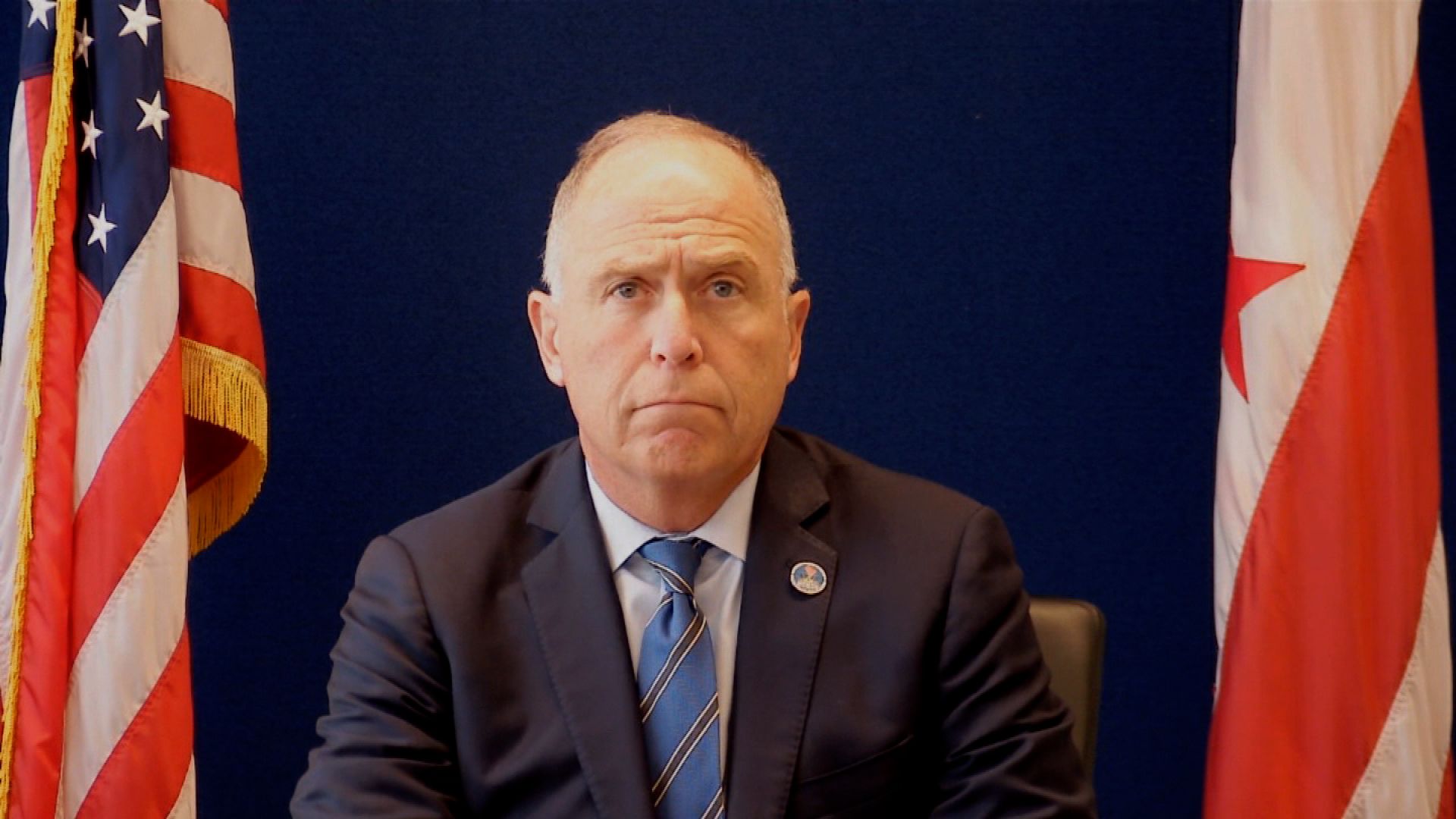
Trump’s flag-burning order draws rare fire from conservatives
Entities mentioned:
- Donald Trump: Power, Control, Patriotism
- Conservatives: Freedom, Righteousness, Justice
- Attorney General Pam Bondi: Duty, Loyalty, Control
- Supreme Court: Justice, Duty, Influence
Article Assessment:
Credibility Score: 75/100
Bias Rating: 55/100 (Center)
Sentiment Score: 35/100
Authoritarianism Risk: 65/100 (Authoritarian Tendencies)
Bias Analysis:
The article presents multiple viewpoints, including both supporters and critics of the executive order from conservative circles. While it leans slightly towards critical perspectives, it also includes defenses of the order, maintaining a relatively balanced approach.
Key metric: First Amendment Protections
As a social scientist, I analyze that this article highlights a tension between executive power and constitutional rights. The executive order targeting flag burning has created a rare divide among conservatives, traditionally united on issues of patriotism. This situation underscores the complex interplay between free speech, symbolic expression, and national identity in American politics. The order's attempt to reinterpret established Supreme Court precedent on flag burning as protected speech may lead to significant legal challenges and debates about the scope of First Amendment protections.

Officials have been planning for weeks to send National Guard to Chicago as Trump seeks to expand crime crackdown
Entities mentioned:
- Trump administration: Control, Power, Security
- President Donald Trump: Power, Control, Legacy
- Chicago Mayor Brandon Johnson: Self-preservation, Justice, Freedom
- Illinois Gov. JB Pritzker: Duty, Security, Self-respect
- Attorney General Pam Bondi: Control, Righteousness, Loyalty
- Boston Mayor Michelle Wu: Justice, Self-preservation, Indignation
Article Assessment:
Credibility Score: 75/100
Bias Rating: 45/100 (Center)
Sentiment Score: 35/100
Authoritarianism Risk: 65/100 (Authoritarian Tendencies)
Bias Analysis:
The article presents multiple viewpoints, including those of the Trump administration and opposing local officials. While it gives more space to critics of the plan, it also includes the administration's perspective, maintaining a relatively balanced approach.
Key metric: Domestic Stability Index
As a social scientist, I analyze that this article highlights a growing tension between federal and local authorities regarding law enforcement and immigration policies. The Trump administration's plan to deploy National Guard troops to Chicago without local consent represents a significant escalation in federal intervention in local affairs. This move could potentially impact the Domestic Stability Index by increasing civil unrest, straining federal-state relations, and challenging constitutional boundaries. The resistance from local officials, particularly in Democrat-led cities, indicates a deepening political divide and potential for conflict between different levels of government. This situation may lead to legal challenges, public protests, and a deterioration of trust in government institutions, all of which could negatively affect domestic stability.

Abrego Garcia’s lawyers urge judge to drop his criminal case, alleging ‘vindictive and selective prosecution’
Entities mentioned:
- Kilmar Abrego Garcia: Justice, Self-preservation, Freedom
- US Department of Justice: Control, Power, Revenge
- Judge Waverly Crenshaw: Duty, Justice, Obligation
- President Donald Trump: Power, Control, Righteousness
- Attorney General Pam Bondi: Loyalty, Power, Control
- Judge Paula Xinis: Justice, Duty, Obligation
Article Assessment:
Credibility Score: 75/100
Bias Rating: 45/100 (Center)
Sentiment Score: 35/100
Authoritarianism Risk: 65/100 (Authoritarian Tendencies)
Bias Analysis:
The article presents both the defense's arguments and the government's actions, maintaining a relatively balanced perspective. While it gives more space to the defense's claims, it also includes factual background and judicial decisions, avoiding overtly partisan language.
Key metric: Rule of Law Index
As a social scientist, I analyze that this case highlights significant tensions between executive power and judicial oversight in the U.S. immigration system. The alleged retaliatory prosecution of Abrego Garcia following his successful challenge to his deportation raises concerns about the abuse of prosecutorial discretion and potential violations of due process. This case could have broader implications for the Rule of Law Index, particularly in areas of government powers, fundamental rights, and criminal justice. The apparent disconnect between court orders and executive actions suggests a weakening of institutional checks and balances, which could negatively impact the U.S.'s performance on this metric. Moreover, the case underscores the complexities and potential injustices within the immigration enforcement system, which could further erode public trust in legal institutions and the fair application of law.

Judge rejects Trump administration request to release Jeffrey Epstein grand jury documents
Entities mentioned:
- Judge Richard Berman: Justice, Duty, Professional pride
- Justice Department: Control, Influence, Obligation
- Jeffrey Epstein: Self-preservation, Power, Greed
- Trump administration: Control, Power, Self-preservation
- Attorney General Pam Bondi: Loyalty, Influence, Control
- Ghislaine Maxwell: Self-preservation, Loyalty, Fear
Article Assessment:
Credibility Score: 75/100
Bias Rating: 45/100 (Center)
Sentiment Score: 35/100
Authoritarianism Risk: 25/100 (Generally Democratic)
Bias Analysis:
The article presents a balanced view of the situation, including perspectives from multiple parties involved. While it mentions right-wing social media influencers, it also notes Democratic reactions, maintaining a relatively neutral stance.
Key metric: Government Transparency Index
As a social scientist, I analyze that this article highlights a significant tension between government transparency and judicial process. The repeated denial of requests to unseal grand jury documents related to the Epstein case by multiple federal judges underscores the importance of maintaining the integrity of the judicial system, even in high-profile cases. This situation challenges the Trump administration's promises of transparency, potentially eroding public trust. The judges' decisions to prioritize victim protection and adherence to legal precedent over public disclosure demonstrate the complex balance between transparency and privacy in sensitive legal matters. This case may have long-term implications for how high-profile investigations are handled and disclosed to the public, potentially influencing future government transparency policies and practices.

Trump admin agrees to allow DC police chief to remain in charge after court challenge
Entities mentioned:
- Attorney General Pam Bondi: Control, Power, Duty
- Chief Pamela Smith: Duty, Professional pride, Security
- DEA Administrator Terrance Cole: Control, Duty, Power
- Judge Ana Reyes: Justice, Duty, Obligation
- Mayor Muriel Bowser: Control, Duty, Self-preservation
- DC Attorney General Brian Schwalb: Justice, Duty, Self-preservation
- President Donald Trump: Control, Power, Influence
Article Assessment:
Credibility Score: 75/100
Bias Rating: 45/100 (Center)
Sentiment Score: 35/100
Authoritarianism Risk: 70/100 (Authoritarian Tendencies)
Bias Analysis:
The article presents multiple perspectives, including those of federal and local officials, which contributes to a relatively balanced view. However, there is slightly more emphasis on local officials' concerns and reactions, which may indicate a subtle lean towards the local government's position.
Key metric: Federal-Local Government Relations
As a social scientist, I analyze that this article highlights a significant conflict between federal and local government authority, specifically regarding control over law enforcement in Washington, DC. The Trump administration's attempt to federalize the DC police force and override local policies, particularly those related to immigration enforcement, represents a major shift in the balance of power between federal and municipal governments. This action challenges the concept of 'Home Rule' in DC and raises questions about the limits of presidential authority in local governance. The legal challenges and negotiations described in the article demonstrate the complex interplay between different levels of government and the role of the judiciary in mediating such conflicts. This situation could have far-reaching implications for federal-local relations, particularly in areas with significant federal presence or in cities with policies that conflict with federal priorities.

House Democrat presses DOJ on Ghislaine Maxwell prison transfer, meeting with top official
Entities mentioned:
- Rep. Jamie Raskin: Justice, Righteousness, Duty
- Ghislaine Maxwell: Self-preservation, Freedom, Control
- Department of Justice: Control, Obligation, Professional pride
- Trump administration: Power, Self-preservation, Control
- Attorney General Pam Bondi: Duty, Professional pride, Loyalty
- Bureau of Prisons Director William K. Marshall III: Duty, Professional pride, Control
- Deputy Attorney General Todd Blanche: Loyalty, Power, Influence
- House Judiciary Committee: Justice, Duty, Oversight
- House Oversight Committee: Justice, Duty, Oversight
Article Assessment:
Credibility Score: 70/100
Bias Rating: 35/100 (Lean Left)
Sentiment Score: 30/100
Authoritarianism Risk: 55/100 (Mixed/Neutral)
Bias Analysis:
The article leans left, focusing on Democratic concerns and potential Trump administration wrongdoing. While it presents factual information, the framing and emphasis on Democratic perspectives suggest a left-leaning bias.
Key metric: Government Accountability and Transparency
As a social scientist, I analyze that this article highlights potential issues in the justice system and government accountability. The unusual transfer of Ghislaine Maxwell to a minimum-security prison and her meeting with a former Trump lawyer raise questions about preferential treatment and possible attempts to influence testimony. This situation could significantly impact public trust in government institutions and the fairness of the justice system. The congressional inquiry led by Rep. Raskin represents an attempt to maintain oversight and transparency, which are crucial for democratic processes. However, the implications of potential interference in legal proceedings and witness treatment could have far-reaching consequences for the integrity of the justice system and the separation of powers.

Federal judge rejects Trump DOJ’s bid to unseal grand jury materials in Ghislaine Maxwell case
Entities mentioned:
- Judge Paul Engelmayer: Justice, Duty, Professional pride
- Trump administration: Control, Influence, Self-preservation
- Department of Justice: Transparency, Duty, Influence
- Ghislaine Maxwell: Self-preservation, Control, Greed
- Jeffrey Epstein: Power, Control, Greed
- Victims: Justice, Self-respect, Security
- Attorney General Pam Bondi: Duty, Loyalty, Influence
- Judge Richard Berman: Justice, Duty, Professional pride
Article Assessment:
Credibility Score: 75/100
Bias Rating: 45/100 (Center)
Sentiment Score: 35/100
Authoritarianism Risk: 25/100 (Generally Democratic)
Bias Analysis:
The article presents a balanced view of the situation, quoting extensively from the judge's ruling. While it mentions the Trump administration's involvement, it doesn't appear to take a partisan stance.
Key metric: Public Trust in Government Institutions
As a social scientist, I analyze that this article highlights a significant tension between the judiciary and the executive branch, specifically the Department of Justice under the Trump administration. The judge's scathing rejection of the DOJ's request to unseal grand jury materials in the Maxwell case reveals a deep skepticism of the government's motives. This conflict could potentially erode public trust in government institutions, particularly the DOJ. The judge's emphasis on the lack of new information in the requested materials and the suggestion that the government's motion might be aimed at 'diversion' rather than transparency raises questions about the administration's true intentions. Furthermore, the mention of victims being used for 'political warfare' underscores the complex interplay between justice, politics, and media attention in high-profile cases. This incident may contribute to a growing perception of government institutions being used for political purposes rather than serving justice, potentially leading to decreased public confidence in the justice system and federal agencies.

Federal appeals court halts criminal contempt proceedings against Trump officials in immigration case
Entities mentioned:
- Judge James Boasberg: Justice, Duty, Righteousness
- Trump administration officials: Power, Control, Self-preservation
- US DC Circuit Court of Appeals: Duty, Justice, Professional pride
- ACLU: Justice, Righteousness, Moral outrage
- Judge Greg Katsas: Duty, Professional pride, Loyalty
- Judge Neomi Rao: Duty, Professional pride, Loyalty
- Judge Nina Pillard: Justice, Righteousness, Professional pride
- Attorney General Pam Bondi: Loyalty, Power, Influence
Article Assessment:
Credibility Score: 75/100
Bias Rating: 55/100 (Center)
Sentiment Score: 35/100
Authoritarianism Risk: 65/100 (Authoritarian Tendencies)
Bias Analysis:
The article presents multiple viewpoints, including dissenting opinions, which suggests an attempt at balance. However, there's slightly more emphasis on the Trump-appointed judges' reasoning, potentially indicating a subtle center-right lean.
Key metric: Rule of Law Index
As a social scientist, I analyze that this ruling significantly impacts the Rule of Law Index for the United States. The appeals court's decision to halt criminal contempt proceedings against Trump administration officials weakens judicial oversight of executive actions, potentially undermining the checks and balances system. This could lead to a decrease in government accountability and adherence to court orders, which are key components of the Rule of Law Index. The split decision along partisan lines (Trump-appointed judges vs. Obama-appointed judge) also raises concerns about the politicization of the judiciary, further eroding public trust in the legal system. The ruling's emphasis on executive power over judicial authority in matters of immigration and foreign policy may set a precedent that could have long-term implications for the separation of powers and the ability of courts to check executive overreach.

Top Trump officials discussed Epstein at White House meeting Wednesday night
Entities mentioned:
- Attorney General Pam Bondi: Justice, Professional pride, Power
- FBI Director Kash Patel: Duty, Control, Security
- Vice President JD Vance: Unity, Influence, Obligation
- White House chief of staff Susie Wiles: Control, Loyalty, Unity
- Deputy Attorney General Todd Blanche: Justice, Duty, Professional pride
- Deputy FBI Director Dan Bongino: Security, Control, Professional pride
- Jeffrey Epstein: Power, Greed, Control
- Ghislaine Maxwell: Self-preservation, Loyalty, Fear
Article Assessment:
Credibility Score: 65/100
Bias Rating: 50/100 (Center)
Sentiment Score: 35/100
Authoritarianism Risk: 55/100 (Mixed/Neutral)
Bias Analysis:
The article presents a balanced view of the situation, citing unnamed sources and reporting denied claims. It refrains from overtly partisan language or framing, maintaining a neutral stance in its reporting of the events and conflicts.
Key metric: Government Transparency and Accountability
As a social scientist, I analyze that this article reveals internal tensions and strategic disagreements within the Trump administration regarding the handling of the high-profile Epstein case. The last-minute change of meeting location to the White House suggests a desire for increased control over information and optics. The potential publication of the Maxwell conversation transcript indicates a struggle between transparency and strategic information management. The conflicts between top officials, particularly Bondi and Patel, highlight the challenges in coordinating a unified response to a sensitive and politically charged issue. This situation underscores the complexities of balancing justice, political considerations, and public perception in high-level government operations.

Victim in Epstein case decries ‘political warfare’ in effort to release grand jury transcripts
Entities mentioned:
- Jeffrey Epstein victims: Justice, Self-preservation, Security
- Justice Department: Control, Duty, Obligation
- President Donald Trump: Self-preservation, Power, Control
- Judge Richard Berman: Justice, Duty, Obligation
- Attorney General Pam Bondi: Duty, Loyalty, Influence
- FBI: Duty, Control, Obligation
Article Assessment:
Credibility Score: 75/100
Bias Rating: 45/100 (Center)
Sentiment Score: 30/100
Bias Analysis:
The article presents multiple perspectives, including those of victims and various government entities, suggesting a relatively balanced approach. However, there is a slight lean towards criticism of the Trump administration's handling of the case, which is balanced by factual reporting of events and actions taken by different parties.
Key metric: Public Trust in Government Institutions
As a social scientist, I analyze that this article highlights a significant tension between victims' rights, government transparency, and political maneuvering in the high-profile Epstein case. The victims' frustration with the handling of sensitive information reflects a broader issue of trust in government institutions. The Justice Department's actions, including selective information sharing and subsequent withholding, suggest potential political motivations that could further erode public confidence. This case exemplifies the challenges in balancing victim protection, public interest, and political considerations in high-stakes legal matters. The apparent disconnect between victim concerns and government actions may contribute to a decline in public trust, particularly regarding the handling of cases involving powerful individuals.